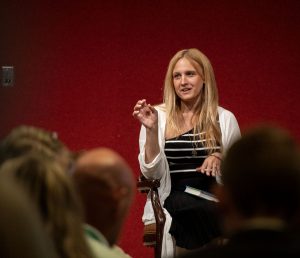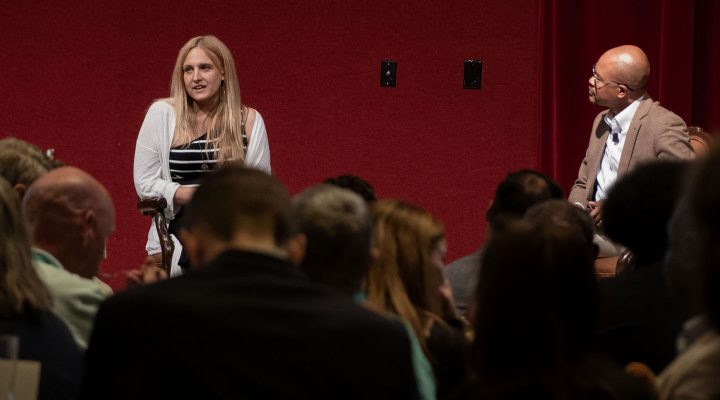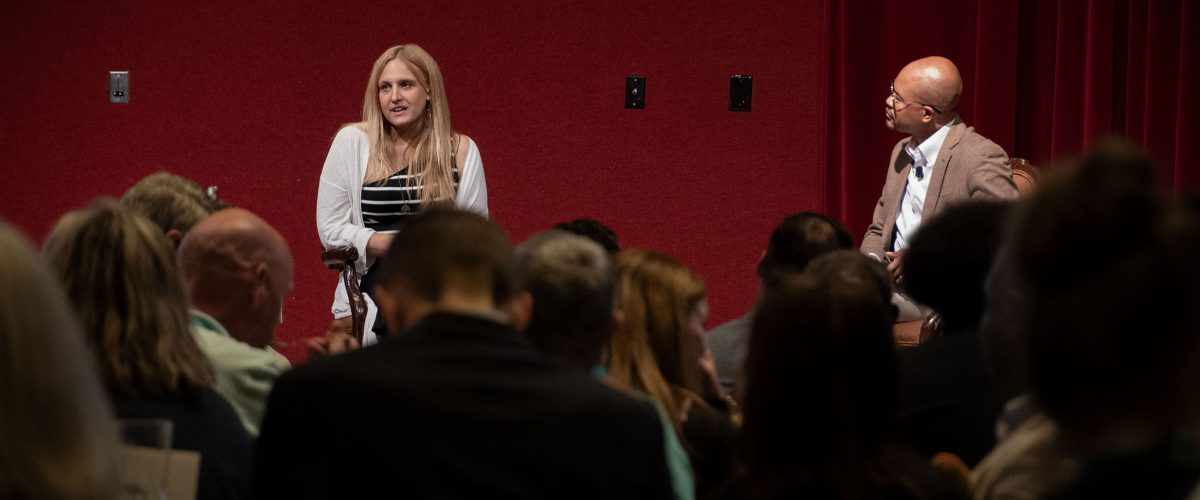A “slow, gradual shift” moved Sarah McCammon from deeply ingrained evangelical certainty to a career studying the intersection of faith and politics, she told participants at a Baptist News Global gathering June 20.
McCammon is a national political correspondent for National Public Radio, cohost of “The NPR Politics Podcast” and author of The Exvangelicals: Loving, Living and Leaving the White Evangelical Church.

Sarah McCammon (Photo by Cherilyn Crowe Guy)
McCammon discussed her book, which examines her spiritual and intellectual journey as a window into American evangelicalism, with Timothy Peoples, pastor of Wilshire Baptist Church in Dallas and a BNG board member. They talked during the annual Friends of BNG Dinner, held in conjunction with the Cooperative Baptist Fellowship general assembly in Greensboro, N.C.
“The book is sort of the product of an unexpected and sometimes uncomfortable intersection of my personal life and my professional world,” McCammon said. She organized her presentation around the “cognitive dissonance I felt” as she tried to reconcile the religious structure in which she was raised with her natural curiosity and what she saw of the world.
In 2016, McCammon was NPR’s lead political reporter covering the Donald Trump presidential campaign, which highlighted some of that dissonance. “Everyone remembers the big question for that campaign,” how the “right evangelical base of the Republican Party could support someone like Donald Trump,” she said.
“I was thinking a lot about my own background during this time. … My whole world was an evangelical bubble,” she said of her early life, noting she was a member of a Christian church, attended a Christian school, her TV viewing was “filtered” and Focus on the Family was a major shaper of beliefs and behavior.
“We felt very sure we had the right beliefs, and it was our job to make sure everybody else did, too.”
“We felt very sure we had the right beliefs, and it was our job to make sure everybody else did, too,” she recalled. “There was this incredible sense of responsibility to not just show the love of God to them, but to make sure they believed the right thing.”
But someone she loved deeply lived outside that bubble and did not share those beliefs.
“My grandfather was one of the very few people I knew growing up who was not a Christian,” she said. “One of the hardest things for me along the way was my grandpa was a huge figure, but he didn’t share our beliefs and was a gay man.”
While McCammon feared for her grandfather’s fate, she also lived in a lot of fear of the world and things she didn’t understand, she said. “Any time I would think about changing my opinion or evolving my views, it was so scary. If you ask the wrong question, people look at you funny or confront you. … You better stay in line, or you might not be one of ‘us’ anymore. For me, it was a slow, gradual shift away from that world.”
Many people McCammon interviewed for her book talk about the sense of loss they feel when their religious views change, she said. “A lot of groups are this way, not just evangelicals,” she added, pointing out change can be extremely challenging.
“One thing people (who change or leave religion) do lose often is community, and it can be a challenge to figure out,” she said. People feel the void from such varied sources as other religious groups, art, yoga and family. “It’s different things from different people.”
Peoples pointed out McCammon has said one reason she became a journalist is because she craved space to ask questions and to take in new information while considering issues from multiple viewpoints.
“How do you live in a democracy without talking to each other?”
“One thing that concerns me is increasing polarization of our country,” she responded. “I went into public media to be in a space where I could talk to many people. … How do you live in a democracy without talking to each other? I wanted to foster that, but there are fewer and fewer spaces where people are doing that. …
“In some Christian spaces, there was a confined way to look at things. I craved the opportunity to participate in that (larger) dialogue.”
Peoples pointed to research that suggests one-third of evangelicals have left the church.
“We’re seeing religious decline across the board, not just in evangelicalism,” McCammon acknowledged. She also pointed to at least one cause.
“‘Evangelical’ has become a political label and a racial label as well,” she explained. Robert Jones, founder of Public Religion Research Institute, “argues there is a tie between deepening alliance of white evangelicalism with a type of politics. Then he connects that to the decline of white political power and dominance.”
A factor in this is what McCammon called the “evangelical impulse.”
“It’s the idea that we have it all right — certainty,” she said. “When approaching matters of faith, you have to have a certain amount of humility. Our view of God is shaped by culture, context, lived experience and the people around us. I have known people who are serious about discerning the world, and they have come to different conclusions.
“So, certainty melded with a mission for political power — extremism in all forms — should concern us.”


